A crit on the side
Bored after the Tour de France? For the ultimate post-Tour racing fix, we accompany Robbie McEwen to two post-Tour criteriums
Words by Edward Pickering
Photography by Luc Claassen
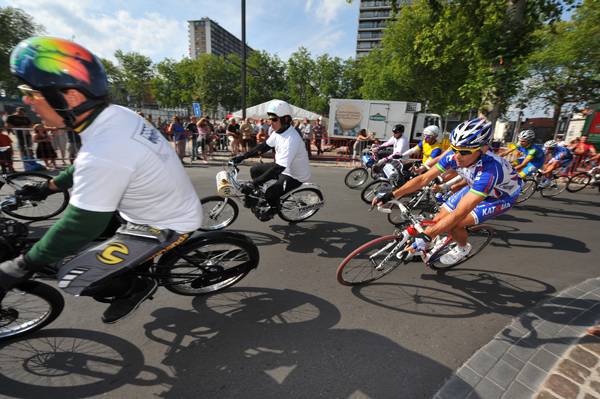
MONDAY AUGUST 9
BRAKEL, 14:20
Forget hanging around in freezing fog on the Col du Tourmalet with men in gimp suits and mankinis, while getting dirty looks from Basque separatists. Spectating at bike events doesn’t have to be difficult.
Watching the Tour de France in the mountains usually involves getting up at three in the morning with a cognac hangover in order to sit in a traffic jam, before being told, non, the road is closed, by an authoritatively uncompromising gendarme in mirror shades. Then you walk eight kilometres up a steep hill, wait all day for something to happen, get hit in the head by a packet of Haribo from the publicity caravan and take some blurred photos of unidentifiable cyclists to post on the internet. That’s all before you realise you can’t remember where you parked your car.
The latest race content, interviews, features, reviews and expert buying guides, direct to your inbox!
So I’m going to see some post-Tour criteriums instead, with Robbie McEwen. McEwen has probably made more money by putting on his race face at a different town every day for a month than some pros make in their entire careers.
A post-Tour crit is as easy to spectate at as the mountains are logistically complicated. They're held on short circuits, in front of big crowds, so that the only people making an effort are the riders. Crucially, they also sell beer at criteriums. Cycle Sport likes beer.
We’ve just left McEwen’s house in Brakel, Belgium, and we’re running a bit late.
“2:20 now, the satnav’s telling me it takes an hour and 10 to get there,” McEwen thinks aloud. Given that we really need to arrive at three, we're probably cutting it fine.
“We’ll need to get there 15 minutes quicker than that,” he continues, as we drive at 20 miles per hour along a rural road in deepest Flanders, behind a small car which McEwen is unconsciously criticising under his breath.
“Like a bloody scooter with a roof,” he says, before pulling out and executing a trademark jump past.
McEwen is on his way to the criterium in Wilrijk, a suburb of Antwerp. It’s a small event, with only 19 riders, but has an interesting twist – it’s raced behind dernys, motorised bikes which pace the riders and shelter them from the wind. Everything else is par for the post-Tour course – the winner will be decided in advance, the crowd will be entertained by some spectacular and fast racing, and beer will be available all the way round the course.
SOMEWHERE IN BELGIUM, 14:55
The main road is closed.
“I think we need to do a U-turn,” says McEwen, and two seconds later we are pointing the opposite way, while the female voice of the satnav tells us we are no longer going in the right direction. Then she helpfully informs us we’re still 40 minutes away – McEwen’s hardly going to have time to get changed and wave to the crowds. Worse, he’s risking being last in the queue to pick a derny rider, and ending up with the skinny guy. Nobody wants the skinny derny rider.
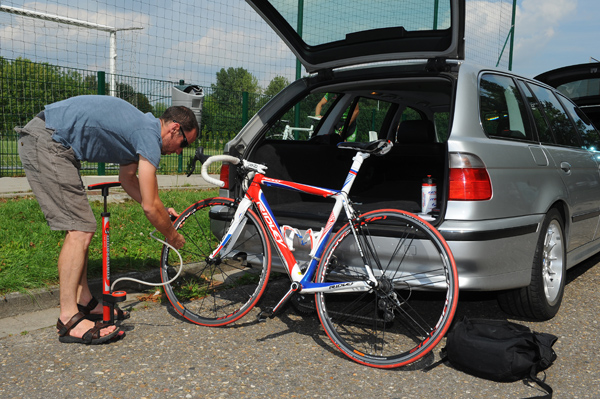
RACE HEADQUARTERS, WILRIJK, 15:40
The race is starting in 20 minutes. Actually, it’s not, because the star turn (that’s us) has only just driven into the car park. McEwen jumps out, says hello to Nico Eeckhout, who has already changed and pinned his race number on, and tells CS to “put 100 psi in the tyres,” while he disappears to the race headquarters. A group of derny riders of varying degrees of rotundity, most of whom have moustaches, are standing around, smoking cigarettes.
McEwen’s not just gone to HQ to get changed. While he’s there, he’ll be informed of where he’s going to finish. The post-Tour crits are exhibition races, put on for the benefit of the public, to give them a chance to see the heroes of the Tour de France at close quarters. Nobody wants to see Alberto Contador beaten by some local elite-without-contract, or Mark Cavendish beaten by an opportunistic breakaway of Tour also-rans. So Contador, Cavendish, or whichever Tour hero has been designated by the organisers, will win, probably in front of another big rider, and then a heroic local guy, so that everybody is happy. There’ll be dramatic breakaways, fast racing, attacking and some quite plausible grimacing on the faces of the riders, but there’s only one important thing. The big name wins. That said, we got caught out in Prague a few years back when Czech semi-nonentity Ondrej Sosenka beat Lance Armstrong, after we’d assured a few of the locals that the result would be a foregone conclusion for the American. Our faces were as red as the lights in the district where all the stag parties were hanging out.
McEwen emerges from the HQ, dragging his suitcase behind him.
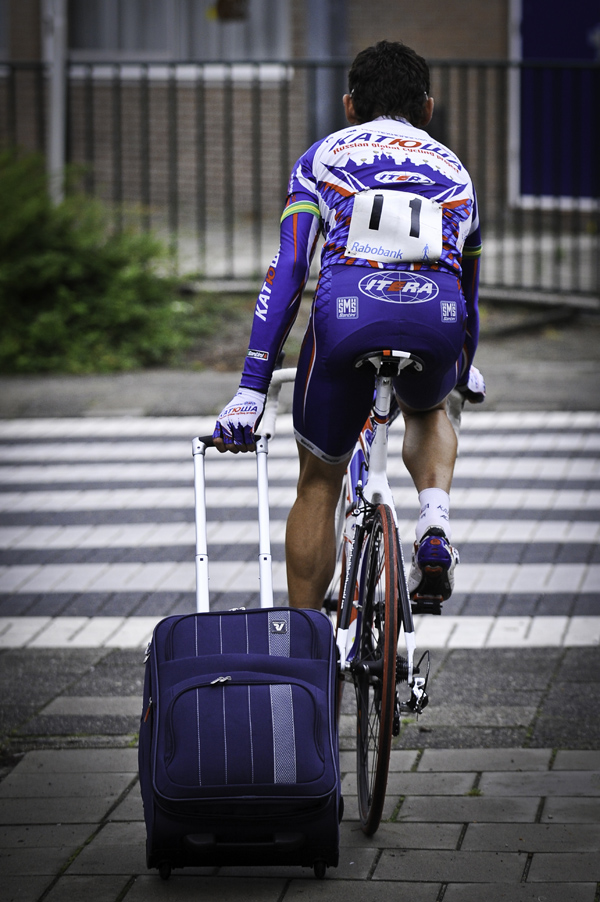
“That’s not full of cash, is it?” I ask.
I’m devastated to hear that modern criterium organisers now pay riders by bank transfer. What happened to the seedy brown envelopes stuffed with cash of yesteryear? They’ll be allowing proper racing to happen next.
“I think I’m feeling good today,” McEwen says as he heads off to the start. “Might finish in the top three.”
START LINE, WILRIJK, 16:20
At the start, the riders hang around in the sunshine and chat. Bjorn Leukemans of Vacansoleil is having a chinwag with Nico Eeckhout. We’re reliably informed that Leukemans is the go-to guy for gossip in the Belgian peloton. “He knows everything about everyone,” our source tells us, with a worried look on his face. The bunch is an odd mix of ProTour and Continental riders, along with a few local pros to make up the numbers. McEwen’s the big name, and he obligingly pulls a wheelie for the crowds at the presentation.
A bemused-looking Christophe Moreau is the only non-Belgian, although as a resident of Switzerland, he won’t have to be bemused by any tax authorities taking an interest in his start money. I initially think that a local schoolkid wearing Cofidis kit has somehow managed to get into the start pen, before I realise it’s Jens Keukeleire, who won four races this spring as a new professional. He really does look extremely young – McEwen, Moreau and Eeckhout, who are 38, 39 and 39 respectively, were all racing as professionals by the time Keukeleire was seven.
One of the riders is huge, with massive track rider’s thighs. His name is Wouter Van Mechelen, although I immediately rechristen him ‘Van Michelin’.
“It’s a good job there are no hills,” I comment to Luc, the photographer.
“He’s an ex-track rider, now an elite without contract. He’s quite big isn’t he?” Luc replies.
There is a silence, as we observe the letters on Van Michelin’s lycra doing a little disco dance every time he moves.
“Maybe a bit too big,” Luc finally says.
The race begins with the derny engines firing up, like a collective clearing of throats, then the riders and their pacers hare off down the road and disappear round the corner for the first of 30 laps. We head to the nearest bar.
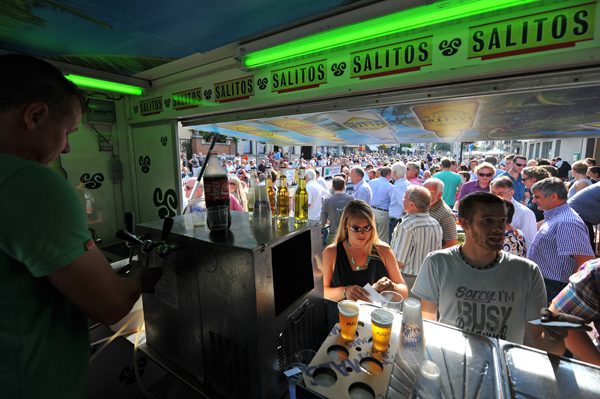
HET SMULHUISJE, WILRIJK, 16:40
The Smulhuisje cafe is doing a roaring trade in beer. I sit next to two of the locals, who are both called Willy. The Willys tell me about Wilrijk, while the riders shoot past for the second lap. Surprisingly, Van Michelin has made the first attack, in spite of the fact he’s the only rider who actually weighs more than his derny rider.
“Not much happens here,” Willy 1 says sadly, “apart from Christmas.”
Willy tells me about last year’s race, won by Alessandro Ballan. He thinks McEwen’s going to win this year’s, although the fact that the Australian has already won in the Antwerp crit makes him think that maybe it’s somebody else’s turn.
“Many years ago, Eddy Merckx came to the Wilrijk race, and he won. You couldn’t move for people,” Willy says.
“By eight o’clock, we’d eaten all the hot dogs, and drunk all the beer.”
FINISH LINE, WILRIJK, 17:45
The Belgian crowd is possibly the least excitable I’ve ever seen at a bike race. At French crits, the crowds will cheer anything that moves, usually whipped up into a hollering frenzy by Tour de France speaker Daniel Mangeas. Admittedly, Mangeas could describe how to make a cup of tea, and make it sound exciting, but there’s a distinct cultural difference.
McEwen will later tell me that the difference is that the French think it’s real.
“Here, they appreciate it for what it is. It’s not a Classic. It’s not a Tour stage. It’s just a nice race,” he says.
Each time the riders come through, with a different combination of riders off the front or chasing, the crowd barely register it, having a look before turning back to their conversations. Before the final lap, they applaud precisely two times – when Christophe Moreau and Robbie McEwen both hit the front with two laps to go, and out of sympathy when elite-without-contract Belgian Edwin Smeulders drops so far behind that he’s in danger of being lapped. Even though it’s a “race,” not a race, they’re still going extremely fast. The average speed, on a circuit with a section of cobbles and several tight bends, is over 44 kilometres per hour.
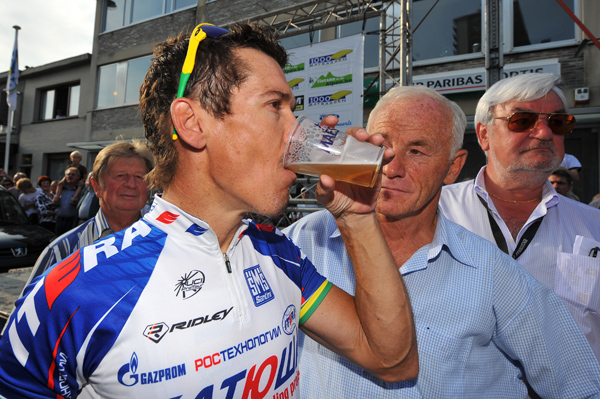
FINISH LINE, 18:15
The riders are approaching the finishing straight for the final time. We’ve all been caught on the hop, because it’s Christophe Moreau who crosses the line first, well ahead of the others. Then we’re caught on the hop again when McEwen is just pipped for second by Ag2r’s Kristof Goddaert.
The master of ceremonies maintains the fiction, asking Moreau how he’d done it. Moreau, sipping a coke, looks surprised, then explains that he attacked on a false flat round the back of the circuit. McEwen is handed a beer, which he downs quickly, to a large cheer.
KASTEEL STEYTELINCK RESTAURANT, WILRIJK, THAT EVENING
At dinner, while working his way through a steak that’s about the same size as his head, McEwen tells me why Moreau won.
“It was something different, a novelty,” he says.
“Everybody expected me to win – the organisers like to do something different after a couple of weeks of crits. That’s why I won in Antwerp – the same derny rider had been pacing the winner in every crit until then, and they gave him to Petacchi. So everybody expected him to win.”
Did Petacchi mind?
“We get on fine, no worries,” McEwen says. “Petacchi doesn’t give a shit as long as he gets his money.”
But, he says, sometimes fragile egos get unhappy with their position.
“I had to win in a Dutch crit once, with Cipo second. I don’t mind second, Cipo said, but you have to attack solo. I was, like, whatever.”
Trouble was, McEwen wasn’t feeling so good, after having ridden the Tour de France, and a series of criteriums already. He attacked through the bell.
“I was going that bad, they started coming back to me. I couldn’t go any faster. At the finish line, they were just behind me, so it looked in the photos like I’d sprinted anyway,” McEwen laughs.
As another rider told me at a criterium a few years back, “Pay money, see monkey dance.”
TUESDAY AUGUST 10
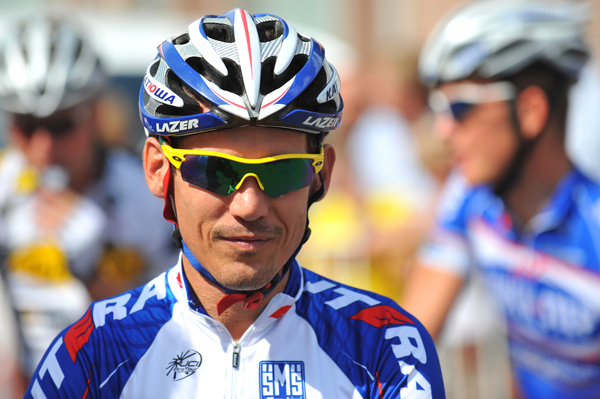
BRAKEL, 16:30
We’re on our way to Naaldwijk, west of Rotterdam in Holland, and it’s raining. McEwen spends the journey telling me that the crits are more than just a fat paycheck for an hour’s work.
“It’s tiring. One year we did a crit in Erik Zabel’s home town, partied all night, then flew to Toulouse at 7am from Dusseldorf,” he says.
“I drove two hours from Toulouse, did a two hour crit, won it, collected my dough, drove back two hours, two hours in the plane, two hours in the car, and back to Belgium.
“Then I slept for a weekend.”
McEwen does OK out of the crits. He gets paid a lot, as a major star, and he does a lot of them. Multiply a lot by a lot, and you’ll end up with somewhere north of 100,000 euros, for a month’s work, on top of a normal racing schedule.
“The rate’s gone down a bit,” McEwen tells me. “Boom time was 2003 to 2007. Luckily for me, my most successful Tour results, and therefore highest number of crit appearances, coincided with the big budgets. One year I did 18 or 20 – I was too tired to really count.”
Nobody really wants to talk exact figures, but the rate ranges from a few hundred euros a pop for the local pros, up to 20,000 or even more for the really big names.
“A good Tour gives you glory and satisfaction,” says McEwen. “Crits give you the money. You could make a quarter of a million euros in a month. But it’s very very tiring.”
Sounds glamorous? Pre-race food for McEwen this evening, and most evenings he rides in a crit, grabbed at a motorway service station, is a factory-made chilli chicken sandwich that looks like it tastes of fridge.
“You get a very shitty eating pattern in the crits,” says McEwen. “You eat breakfast at lunchtime, lunch at dinner, then motorway sandwiches before and after the race, and the car looks like a garbage can.”
McEwen looks at his chilli chicken sandwich.
“I hope I don’t spew,” he says.
DE PIJL SPORTCENTRUM, NAALDWIJK, 19:15
The rain hasn’t eased.
“This officially sucks,” says McEwen as we drive into the race headquarters at a sports centre, parping the horn at Graeme Brown. There’s a stack of bikes leaning against the bushes by the front door, and a quick look at the names on them reveals that this is a higher level race than Wilrijk. As well as McEwen and Brown, Garmin’s Tyler Farrar is here with two Dutch team mates – Martijn Maaskant and Michel Kreder. Tom Leezer, Brown’s team mate on Rabobank, is here, although we can barely make out the name on his bike, which is reassuringly filthy.
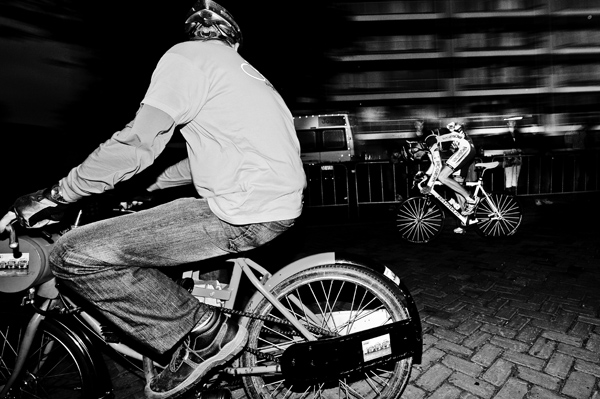
The format of tonight’s criterium is an unusual one – there’s a points race, with sprints every few laps, followed by a flying start time trial of one lap, then a devil-takes-the-hindmost, with the winner being decided on a combined points system that the organisers hope is so fiendishly convoluted that nobody will be able to follow it, thus guaranteeing the right winner.
McEwen disappears into the changing room, while I’m mistaken for a professional cyclist by one of the organisers, which makes Luc the photographer laugh a little too hard. McEwen comes out a few minutes later, along with the other riders. He’ll do better than last night, he reckons, although it’s going to be difficult to win.
FINISH LINE, NAALDWIJK, 20:10
Only in Holland would the finish line of a criterium on a speed bump, along with a metal drain cover. Maybe the organisers were hoping to add a frisson of realism to the racing, by replicating the crash-ridden Dutch stages of last year’s Vuelta and this year’s Giro. At least the rain has stopped.
The race has already started, and the 15-rider bunch is lapping every two minutes or so – the circuit is much smaller than last night’s. The crowd is also much more rowdy, helped by a large beer tent just by the finish line. Sprints seem to be happening every two or three laps, giving the announcer barely enough time to list the results of the last one and the overall totals, before they’re winding it up again. Frankly, I’ve lost count, because I missed the first one when I was checking out the beer tent, and I can only count to three in Dutch.
Three beers, and one large portion of chips later, we’re halfway through the flying lap time trial, and it starts bucketing down, just as McEwen is about to start his lap. Ironic, considering we’d been laughing before the race about the effect the rain had on the Tour Prologue, just a few miles down the road in Rotterdam.
FINISH LINE, NAALDWIJK, 21:50
We’re down to the final five riders for the Devil-take-the-hindmost. Predictably, it’s McEwen, Farrar, Brown, Maaskant and Leezer left. In a regular race, these last two wouldn’t have a hope of beating Brown, but it’s more complicated than that.
McEwen’s got to get through to the final three. So’s Farrar. They’re the two biggest names, after all. Trouble is, Tom Leezer was meant to win the time trial, but he had to ride in the rain, so he didn’t even score any points.
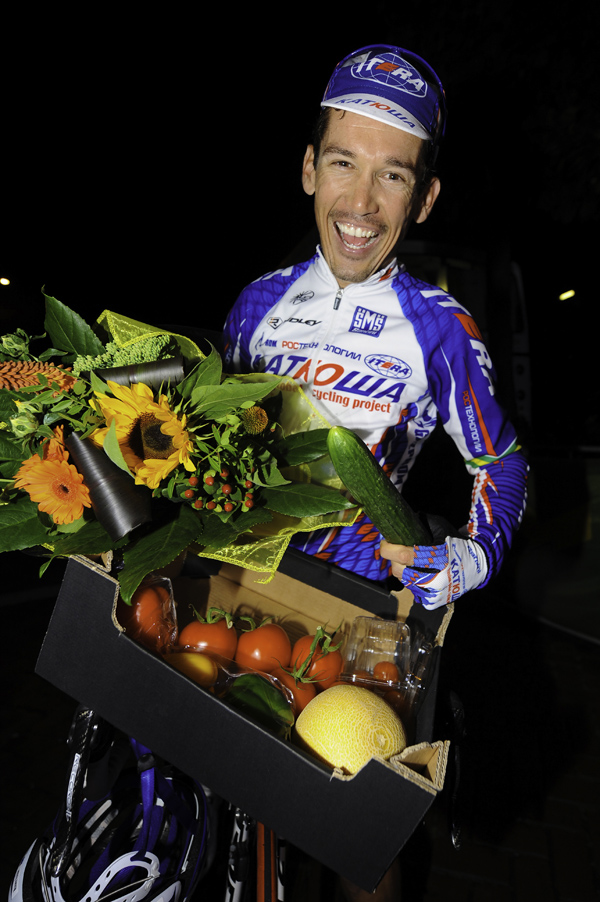
“Leezer had to win the devil to finish on the podium as planned,” McEwen tells me afterwards. “We had to work out on the hoof what all the points were.”
Tom Leezer’s a decent rider, but he wouldn’t outsprint Farrar and McEwen. So here he is, on the bell lap, going for a flyer, with McEwen and Farrar dramatically looking at each other and each refusing to lead the chase. It’s just like Denis Menchov on Ax-3-Domaines this year, with Schleck and Contador doing trackstands.
A minute and a half later, he’s won the Devil. The overall winner is Farrar, with McEwen second, and local boy Leezer’s tactical genius having gained him his spot on the podium.
It’s been a long evening and a tiring couple of days for McEwen, and he’s still got a two and a half hour drive in the pouring rain, to get home, with a short break for another service station sandwich.
But McEwen will leave Naaldwijk happy, along with several thousand euros, and a surprise gift from the organisers.
“That was awesome,” McEwen tells Cycle Sport after the presentation. “I won a box of vegetables.”
This article first appeared in Cycle Sport October 2011
Follow Cycle Sport on Twitter: www.twitter.com/cyclesportmag
Edward Pickering is a writer and journalist, editor of Pro Cycling and previous deputy editor of Cycle Sport. As well as contributing to Cycling Weekly, he has also written for the likes of the New York Times. His book, The Race Against Time, saw him shortlisted for Best New Writer at the British Sports Book Awards. A self-confessed 'fair weather cyclist', Pickering also enjoys running.